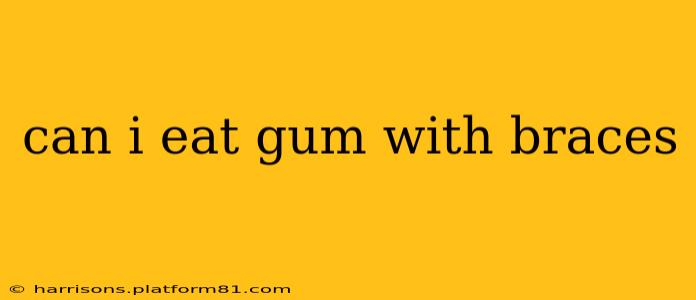Having braces is a commitment to a straighter, healthier smile. But with that commitment comes a lot of questions, particularly about diet. One common query is: Can I eat gum with braces? The short answer is: it's complicated, and generally, no, you shouldn't chew gum with braces. Let's delve into the reasons why.
Why You Shouldn't Chew Gum With Braces
Chewing gum, even sugar-free varieties, presents several risks for those with braces:
-
Damage to Braces: The sticky nature of gum can easily get trapped in your braces, potentially pulling off brackets or bending wires. This can disrupt your orthodontic treatment, prolonging the overall process and potentially costing you extra money for repairs. The force exerted while chewing can also loosen the brackets, causing discomfort and delaying treatment.
-
Wax Buildup: Even sugar-free gum can contribute to plaque buildup around your braces. This can lead to increased risk of cavities and gum disease, negating the positive effects of your orthodontic treatment. The sticky residue makes it harder to maintain optimal oral hygiene.
-
Bracket Breakage: Certain types of gum, particularly those that are tough or require forceful chewing, can put excessive pressure on your brackets, leading to breakage. Replacing broken brackets is time-consuming and adds to the overall cost of your treatment.
-
Wire Damage: The wires connecting your brackets are delicate and prone to bending or breaking under excessive force. Chewing gum increases this risk significantly, potentially causing discomfort and requiring an adjustment appointment.
What Kinds of Gum Are Especially Bad for Braces?
Essentially, all gum poses a risk, but some are more problematic than others. Avoid chewing any gum while wearing braces, but particularly steer clear of:
- Sugar-containing gum: The added sugar increases the risk of cavities significantly.
- Extra-firm or tough gum: These types require more force to chew, putting added strain on your braces.
- Gums with hard pieces: These could damage your braces directly.
What Can I Chew Instead of Gum?
If you're looking for something to satisfy a chewing urge, consider these healthier alternatives:
- Sugar-free hard candies: These offer a similar oral stimulation without the stickiness of gum. However, consume these in moderation.
- Sugar-free lozenges: These can soothe a sore throat and provide a mild chewing sensation.
- Chewing on a carrot stick or piece of celery: These offer a healthy and satisfying alternative that won't harm your braces.
Can Sugar-Free Gum Be an Exception?
While sugar-free gum is marketed as a healthier option, it still carries significant risks for individuals with braces. The stickiness remains a major concern, potentially leading to the same issues as regular gum. It's best to avoid gum altogether to safeguard your orthodontic treatment.
What Happens if Gum Gets Stuck in My Braces?
If gum gets stuck in your braces, don't panic. However, don't try to forcibly remove it. Attempting to pull it out yourself could damage your braces further. Instead, gently rinse your mouth with water. If it persists, contact your orthodontist for assistance.
Is it okay to chew gum after my braces are removed?
Yes! Once your braces are removed, you can safely return to chewing gum, as long as you maintain good oral hygiene practices and opt for sugar-free options to prevent cavities.
In conclusion, while the temptation might be there, it's crucial to avoid chewing gum while you have braces. The risks far outweigh any benefits. Protecting your investment in a beautiful smile is worth foregoing the occasional piece of gum. Remember to always consult your orthodontist for any specific dietary advice regarding your braces.
